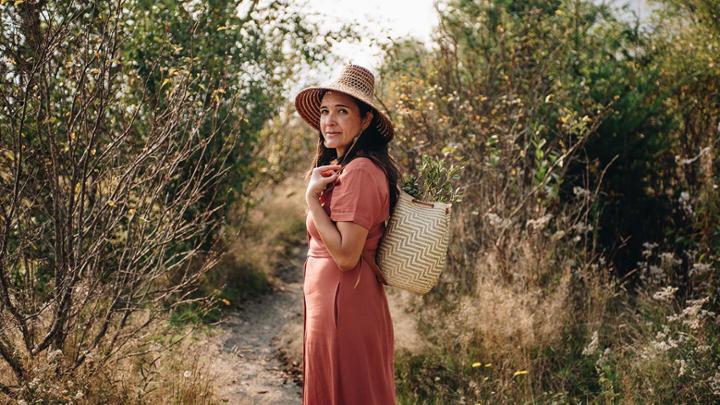Leigh Joseph/Styawat

- Category: Indigenous Community Alumni Award, 2023
- UVic degree: Bachelor of Science in Biology, 2010; Master of Science in Environmental Studies, 2012
- Current hometown: Brackendale, BC
- Birthplace: Victoria, BC
About Leigh
Leigh Joseph (ancestral name Styawat) is an ethnobotanist, researcher and entrepreneur from the Squamish First Nation and is completing her PhD in ethnobotany. She is the co-director and subject of the documentary Walking with Plants, which was nominated for three Leo Awards. Her writing has been published in the journals Frontiers in Sustainable Food Systems, Canadian Journal of Botany and International Journal of Indigenous Health, and she contributed a chapter on the renewal of Indigenous plant knowledge to the book Plants, People, and Places.
As founder of beauty brand Sḵwálwen Botanicals, Leigh brings together Indigenous science and self-care, providing luxury skincare and wellness products that draw from the ceremonial aspects of plants. She aims to contribute her voice as an Indigenous academic so that other Indigenous authors and students will feel represented and reflected in ethnobotany literature.
Her first book, Held by the Land: A Guide to Indigenous Plants for Wellness, is part narrative, part field guide and recipe book that draws on her lived experience as an Indigenous woman, her training in Western Science and her cultural journey toward identity.
What's your favourite memory of being a UVic student?
Once I decided to pursue ethnobotany, I felt really excited and inspired to be on campus. I would go to Finnerty Gardens to study for my exams, and I felt a deep sense of purpose and excitement for what I was studying. I always loved the feeling of the UVic campus—having those green spaces to go to—but it also felt like a welcoming and manageable campus to navigate.
How did your experiences at UVic shape who you are or contribute to future successes?
I met some key mentors at UVic, including Dr. Nancy Turner. Through my work with Nancy, I was connected with Indigenous community leaders from the Kwakwakaw’akw, W̱SÁNEĆ and lək̓ʷəŋən territories, and those experiences helped me bridge community-based research and my own personal path to reconnecting to culture through working with and learning about plants.
Then I did a community placement in Squamish (my home community), which was really the first time I’d come home as an adult, having not grown up in Squamish. Both of those experiences laid a foundation for me in terms of how I wanted to approach community-based research, the importance of spending time on the land and the joy of working with Indigenous communities on health and identity through plants.
What skills or traits are needed to be good at what you do?
I think having that seed of passion. My academic path has been inseparable from my personal path of cultural reconnection and identity. Having an open mind and heart in terms of knowing that you’re always going to be learning, humility and a foundation of education. Whether you’re an Indigenous or non-Indigenous researcher, it is so important to be informed of the colonial history and impacts, and to understand how that intersects with your area of study.
What is the best advice someone has given you?
One thing I’ve heard from many Indigenous Elders that I’ve worked with is we’re always learning. You never stop learning. And then there’s one other piece of advice that my great aunt gave me. She was a knitter and would spin wool and she was always busy working with her hands. She talked about how when you’re working with your hands, you bring yourself into your body. And now as an adult, I think about that from a mindfulness perspective and really being present in the work that I do.
What is something small or large that you do for others?
Ever since I became a mother (my kids are 7 and 9) I reflect a lot on the impacts of residential school experiences on my grandparents’ generation and my dad’s side of the family due to a disconnect between people’s ability to access the land and learn from the land. Me reinstating these practices with my kids—taking them outside and walking and identifying plants and harvesting—is connected to a much larger rebuilding of continuity with ancestral knowledge and practice. It brings me a lot of peace of mind and joy and emotion because I think about my family members that didn’t get that chance.
What is something that always makes you laugh?
I’m thinking of my kids right now because there’s so much laughter with them and so much of a reminder of being a kid and having a lightness and a humour in the day to day. I think they’re hilarious.
What's the last great thing you've read and or watched?
I’ve been listening to audio books lately. I really enjoyed Two Trees Make a Forest by Jessica J. Lee. It is really beautiful. Lots of parallels in terms of reconnecting ancestry and homeland through plants and connections to nature. I’ve also been watching the latest episodes of Yellowstone. That’s my guilty pleasure.
What are you grateful for?
My experiences laid the foundation for me to reconnect to community and culture in such profound ways. Throughout my experiences at UVic, I had cultural teachers and people helping guide me on how to bridge being a researcher within my own community and other Indigenous communities. And I feel really grateful for that.
About the Distinguished Alumni Awards
Learn more about how to nominate an alum.
